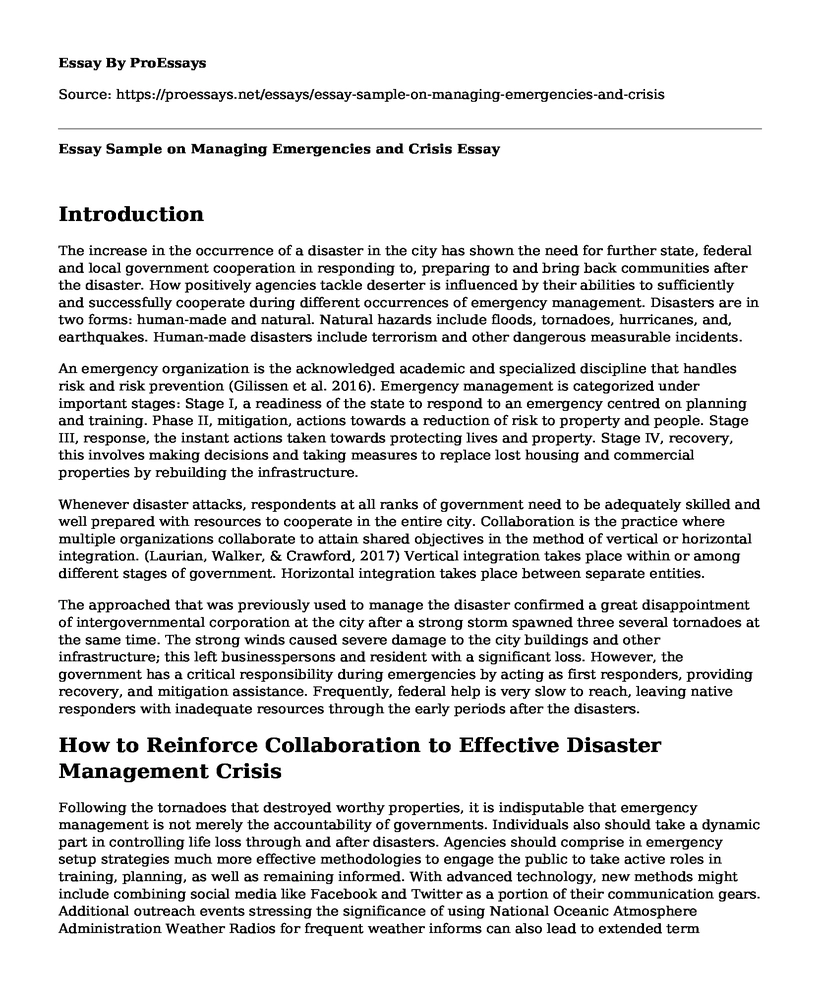Introduction
The increase in the occurrence of a disaster in the city has shown the need for further state, federal and local government cooperation in responding to, preparing to and bring back communities after the disaster. How positively agencies tackle deserter is influenced by their abilities to sufficiently and successfully cooperate during different occurrences of emergency management. Disasters are in two forms: human-made and natural. Natural hazards include floods, tornadoes, hurricanes, and, earthquakes. Human-made disasters include terrorism and other dangerous measurable incidents.
An emergency organization is the acknowledged academic and specialized discipline that handles risk and risk prevention (Gilissen et al. 2016). Emergency management is categorized under important stages: Stage I, a readiness of the state to respond to an emergency centred on planning and training. Phase II, mitigation, actions towards a reduction of risk to property and people. Stage III, response, the instant actions taken towards protecting lives and property. Stage IV, recovery, this involves making decisions and taking measures to replace lost housing and commercial properties by rebuilding the infrastructure.
Whenever disaster attacks, respondents at all ranks of government need to be adequately skilled and well prepared with resources to cooperate in the entire city. Collaboration is the practice where multiple organizations collaborate to attain shared objectives in the method of vertical or horizontal integration. (Laurian, Walker, & Crawford, 2017) Vertical integration takes place within or among different stages of government. Horizontal integration takes place between separate entities.
The approached that was previously used to manage the disaster confirmed a great disappointment of intergovernmental corporation at the city after a strong storm spawned three several tornadoes at the same time. The strong winds caused severe damage to the city buildings and other infrastructure; this left businesspersons and resident with a significant loss. However, the government has a critical responsibility during emergencies by acting as first responders, providing recovery, and mitigation assistance. Frequently, federal help is very slow to reach, leaving native responders with inadequate resources through the early periods after the disasters.
How to Reinforce Collaboration to Effective Disaster Management Crisis
Following the tornadoes that destroyed worthy properties, it is indisputable that emergency management is not merely the accountability of governments. Individuals also should take a dynamic part in controlling life loss through and after disasters. Agencies should comprise in emergency setup strategies much more effective methodologies to engage the public to take active roles in training, planning, as well as remaining informed. With advanced technology, new methods might include combining social media like Facebook and Twitter as a portion of their communication gears. Additional outreach events stressing the significance of using National Oceanic Atmosphere Administration Weather Radios for frequent weather informs can also lead to extended term recovery energies and helps in reducing life loss.
Other investments and improved application of accessible technologies comprising progressive computing, geographic data system, remote detecting, professional system and Internet, as well as wireless machinery required for efficient emergency management. City agencies are as well encouraged to put forward regulative orders that would stop property creators from prioritizing profits above safety.
Conclusion
An emergency board is possibly the most difficult roles of governments and needs involvement from a broad spectrum of shareholders comprising private, non-governmental organizations, and the public. Success wants sufficient planning, training, financing, and effective inter-governmental cooperation at all stages of government. In the meantime, local regimes are in well positions to comprehend and meet the wants of the public. Emergency response should be regionalized to the lowest stage of government.
References
Gilissen, H. K., Alexander, M., Matczak, P., Pettersson, M., & Bruzzone, S. (2016). A framework for evaluating the effectiveness of flood emergency management systems in Europe. Ecology and Society, 21(4).Retrieved from: https://dspace.library.uu.nl/handle/1874/341475
Laurian, L., Walker, M., & Crawford, J. (2017). Implementing environmental sustainability in local government: the impacts of framing, agency culture, and structure in US cities and counties. International Journal of Public Administration, 40(3), 270-283. Retrieved from: https://www.tandfonline.com/doi/abs/10.1080/01900692.2015.1107738
Cite this page
Essay Sample on Managing Emergencies and Crisis. (2022, Dec 02). Retrieved from https://proessays.net/essays/essay-sample-on-managing-emergencies-and-crisis
If you are the original author of this essay and no longer wish to have it published on the ProEssays website, please click below to request its removal:
- Research Paper on Hypoglycemia
- Analysis of the Amazon Culture - Research Paper
- Research Proposal: Strategic Management of Public Organizations in China
- Essay on Patients Engaging With Multiple Care Sources: The Rise of Digital Health
- Essay Sample on Cardiovascular Hemodynamics: A Vital Step Towards Improving Congestive Heart Failure Outcomes
- Essay Example on Make Quality Health Care Accessible to All Citizens in USA
- Paper Example on Management History and Theories







